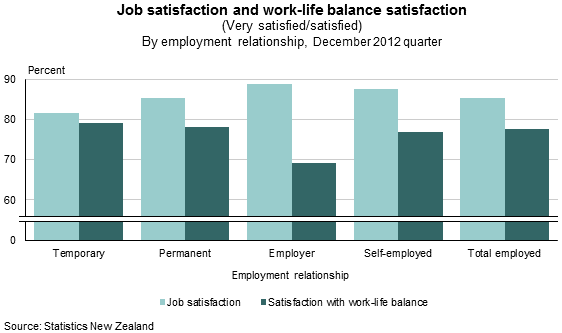As a project manager you likely always have increased productivity at the forefront of your mind. You may run your project team by the ethos of more work=greater productivity=greater project success.
However, this is not the best approach when dealing with living, breathing human beings. If your project team was entirely composed of robots, sure, go for it. We are guessing though that your team members have families, friends, hobbies, and maybe a cat, dog, or chinchilla.
We live in a capitalist economy; people need to work to survive. It’s a fact. Sure, we’d love to spend our days on a beach sipping pina coladas, but we are project managers. We need to work to get to that point, where eventually we can kick our feet up and watch the sun set into the horizon.
As you can see below, for temporary and permanent employees (read: the employees working on your projects) job satisfaction is closely linked to work life balance. Job satisfaction results in less employee turnover, and just if not more importantly, increased productivity.

Work-life balance, for your health
There are numerous studies and articles demonstrating how working a 12-hour days, week after week, sucks the chutzpah out of your staff.
You may be asking yourself, “Wait, doesn’t my staff already know how to balance their work life and personal life? Why should I concern myself with this?”
You are the project manager; the boss. You wield authority over your team, and even if you do not intend such you may seem a bit intimidating. Employees may be reticent to voice if they are feeling overworked, or if a temporary personal issue is adding undue stress and needs to be addressed.
Being overworked leads to being burnt out, and what good is burnt out staff? Sure, they might still show up to work, but if they are less productive due to physical or mental exhaustion, you may as be tossing their paycheck into a paper shredder.
Overworking your employees is literally killing them slowly. If your team isn’t able to enjoy their personal lives off of work, then what are they even working for?
Not only are long hours responsible for physical fatigue, but the combination of long hours plus a lack of an active personal life is a major contributor to depression. If your staff cannot get out of bed in the morning, they are even more useless than if they show up but cannot effectively work.
Establish firm work-life boundaries
As we mentioned previously, as project manager you influence your team’s expectations of their dedication to their work life. A clever project manager will inform new hires that there are work boundaries, as in these are the set weekly work hours, these you dedicate to work, and the rest is your life.
Boundaries are a productivity-positive two-way street. On one hand you are demonstrating that you respect the value of their personal time off of work, and the other hand you are underscoring the importance of their time in the workplace.
Employees respect not only when their manager is straightforward with them, but also will be more motivated to work hard when they are in the workplace. Employees that believe they possess an even work-life balance work 21% harder than employees that do not.
When employees are aware that there are boundaries in place that respect their personal time, they are willing to work their tails off while at work. When an employee doesn′t need to go to bed with their smartphone in hand to answer late-night emails, work the next day doesn′t seem so invasive and terrifying.
To further fortify your company’s work life balance boundaries, insist that your employees do not work more hours than assigned, unless they absolutely, wholeheartedly are willing to. Long hours are not your friend for project productivity.
This may sound counterintuitive, but working fewer hours results in more productive employees. Take into account a recent study by the Organization for Economic Co-operation and Development: In Greece, the average work week is 42 hours. Conversely, in Germany where the average work week is 28 hours, employees are 70% more productive than those in Greece.
Consider abandoning the standard 40 hour work week. It may not work for all project applications, but give it thought. Numbers don’t lie.
Be flexible with flexibility
Every organization is different, and some projects may require that for periods of time that staff be present on-site Monday through Friday, eight hours per day. However, if possible, take advantage of what working hours flexibility can provide your staff in facilitating a more even work-life balance.
What do we mean by flexibility?
Here’s an example that especially applies to you if you are using cloud-based project management software: You have an employee, “Susan”, who is a single mother. You hired her to work 40 hours a week. Susan’s son finishes school at 2:30 PM. She needs to pick him up.
Susan asks if she can come to the office and then leave, and continue her work from home.
Ask yourself, why not? She has a laptop, and access to the project management software. While we are not advocating that you have your entire staff work from home (a pleasant office environment keeps staff motivated to be productive) this is a case where Susan is able to balance her work and life, and she will value your understanding of her situation.
When employees feel that their personal time is valued, even if it belies traditional hours, they are happier to work harder for your company when they can be flexible with their hours.
Let us be clear though, by flexible hours and location, we do not mean less weekly/monthly hours than stated in the employment contract. If there is an emergency, that is one thing, but if an employee needs to take off early one day, they should be held accountable to make up the hours elsewhere in the week.
When employees work happier, they work faster
The work-life balance is often overlooked as boon to team productivity. As we mentioned earlier, you may have the assumption that your team already knows how vital it is to balance life with work.
As a manager you may may have sent a late night email once to an employee and they responded quickly, but take it from us, that was a mistake. Your staff look up to you, and if that was an infraction against their personal time they may not mention it to you.
Remember to establish work life balance boundaries, and ensure that both yourself as project manager and your team equally adhere to the rules. Also, don’t fall into the trap of believing that if your team works longer hours, that they will actually get more done. Quite the opposite, and it will cost your company and your employees invaluable time and money.
When you and your team are working more productively it leaves more time for pina coladas on the beach.
Follow us


